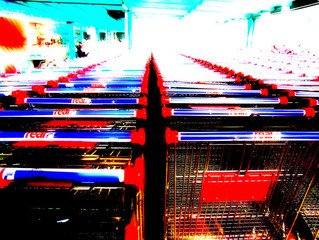Bottom line: Alibaba's plan to roll out 2,000 of its high-tech Hema grocery stores looks overly aggressive but typical for the company, and could prove costly if the concept fails to catch on.
-

- Alibaba has big plans for Hema
E-commerce giant Alibaba (NYSE: BABA) is pretty much a carbon copy of its founder Jack Ma when it comes to standing still, in that the concept is completely foreign to both. I've been critical of the company in the past for getting into too many things too quickly without a coherent big-picture plan, and that's what seems to be happening once more with Alibaba's sudden obsession with finding a formula for the "new retail".
Alibaba seems quite certain that retailing of the future will consist of some form of high-tech features, alongside traditional retailing concepts such as stores where actual products are sold and people can sit down for a fresh-cooked meal. Alibaba has been wheeling out a number of concepts on this new high-tech retail puzzle over the past year, but the latest plan is the first I've seen for an actual widespread roll-out of an actual chain.
Word on this latest move comes in a report that says Alibaba is planning to roll out some 2,000 branches of its new retailing supermarket chain called Hema in the next three to five years. (English article) This is the first I've heard of Hema, though it's possible that this may be the same as the unmanned convenience store that Alibaba hyped during the summer. I later read about an unmanned restaurant also being touted by Alibaba, only to discover it was one and the same as the convenience store project.
But this one sounds like it's something different, as the latest reports say Alibaba actually rolled out the Hema concept last year and will have 22 stores open by the end of 2017. It says cities with stores include Beijing, where I now live and thus should be able to check one out, along with Shanghai, Shenzhen, Guiyang and its hometown of Hangzhou.
A description of the stores makes them sound like something of a hybrid between a supermarket and a kitchen, with customers able to buy items and then have them cooked in in-store restaurants for immediate enjoyment. There's also an emphasis on seafood, and a broader emphasis on freshness. Last but not least, there's an app involved, and the report I read says about half of Hema's sales now take place online. Customers who order online and live nearby can have their items delivered within 30 minutes.
Overly Ambitious?
The new idea sounds sort of interesting, and the idea of being able to order fresh food to have cooked on the premises sounds interesting as well and could have some novelty factor. But the element that struck me was the ambitious plan for these shops, as 2,000 is no small number. But then again, Alibaba was never a company to think small.
Much bigger chains like KFC and McDonald's took two decades or more to approach anything like that size, and these Hema stores appear to be quite a bit larger than a simple convenience store or fast food restaurant. Few supermarket chains in China have that scale either. Then again, Alibaba is not a western company, and also the China of today is much different from the one that KFC and McDonald's came to in the late 1980s and early '90s.
This initiative is just the latest for Alibaba in the high-tech retailing realm, following the unmanned convenience store and a high-tech shopping mall that was also reportedly being built by the company in Hangzhou. Alibaba is now one of the world's 10 largest publicly traded companies, and clearly it didn't get that way by being conservative or thinking small.
It also has plenty of cash to fund this kind of venture, and desperately wants to become a true leader in the retailing landscape of the future. I suspect its view that future retailing will combine high-tech elements with traditional retailing ones is correct, and should commend it for using its deep resources to experiment in a number of new formats. But the 2,000 store plan in such a short time seems quite aggressive to me, and could end up costing the company a big bill if it turns out the formula isn't right.
0
推荐




 京公网安备 11010502034662号
京公网安备 11010502034662号 